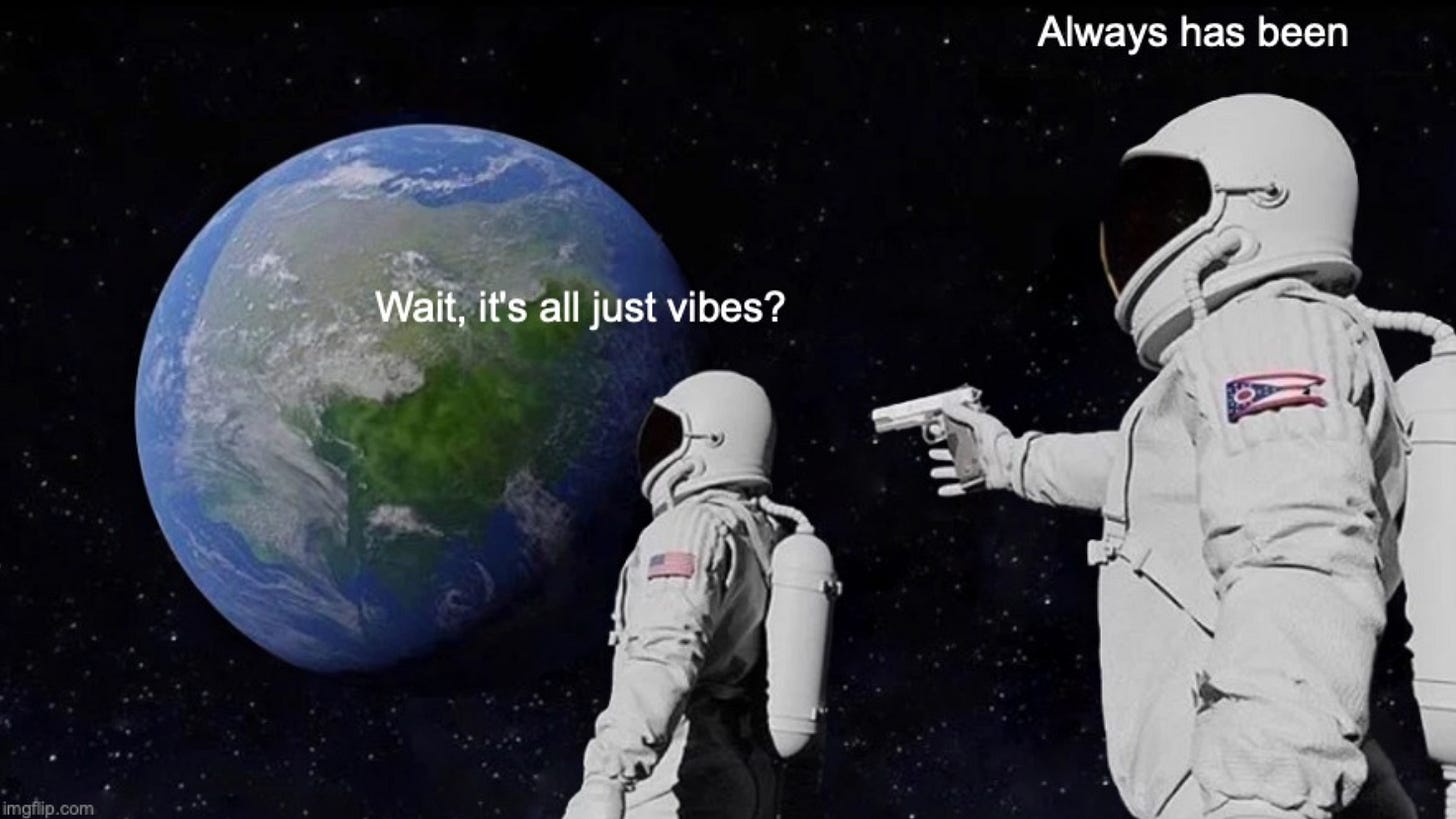In the year 2016, America was experiencing both a low and falling unemployment rate and record low rates of crime. The latter wasn’t too surprising to anyone paying attention, as crime had been falling precipitously since the early 1990s. Unemployment, however, had been quite high just a few years prior, following the Great Recession. Surely, then, 2016 must have been a year of sunny optimism and future-oriented thinking and… yeah you get the idea. It wasn’t that.
But why? If things were getting better, at least according to some of the most important quality-of-life metrics, why did Americans elect a populist firebrand to the presidency that year? Short answer: vibes.
Sometimes, I open up Substack and it seems like all of the most politically-oriented people who previously used Facebook as their ranting/venting platform have migrated here (sigh). One popular narrative I’ve seen emerging among the politically inclined is that VP Harris is running a campaign mostly based on vibes (mood, emotion, attitude) rather that substantial policies; something both Harris’s fans and good-faith critics have pointed out. I don’t really disagree with this popular take, her campaign does seem pretty vibe-heavy to me (with a few good policy ideas and a few questionable ones sprinkled in). My main critique here is that this is a bit of a no shit “water is wet” kind of statement. Of course her campaign is mostly about vibes, because American national politics is almost entirely about vibes and has been for as long as I’ve been alive. Furthermore, most winning presidential campaigns have been the ones that strongly emphasize vibes over policies (recall Obama’s Hope and Change schtick, or Trump’s “American Carnage”). I’m not sure exactly when this trend started. I wasn’t around during the 80s, but I’m tempted to say Ronald Reagan’s “Morning in America” was probably an early trendsetter for these types of highly successful vibe-centric campaigns.
I’m also not sure why it would be surprising that the Harris campaign is adopting this tried-and-true strategy, or why it’s something we should lament in the first place. When you consider how little the president actually controls public policy (thankfully), it kind of doesn’t make sense for a presidential campaign to do anything but vibe it up. People who say “what about the policies” during a presidential election don’t seem to understand how our federal government works.
So here’s the good and bad news about vibes. The bad news should be obvious. Even if things are objectively getting better, as they were in 2016, if enough people sincerely believe that they're getting worse, they can will that darkness into existence, as they did that year. That’s pretty unnerving, especially when you consider how gullible, malleable, and poorly informed most normal voters are. In US politics, feelings simply do matter WAY more than facts ever will. That should be clear to everyone by now.
On the more optimistic side, 2016 seems to be something of an anomaly, given that it’s basically the only time in recent memory that bad vibes won the day (it was also one of those uniquely American elections wherein the winner actually lost the popular vote). So when it’s bad vibes versus no vibes at all (sorry Hillary), the side with vibes still triumphs. But in general, the campaigns that play on positive vibes, like Reagan or Obama, look like the most decisive victories.
What’s fascinating about this election cycle is that it’s the most explicit good vibes vs bad vibes campaign I’ve personally witnessed. Both sides are going hard on the 90% vibes, 10% policy strategy. It’s simply a matter of which vibes resonate more with the American people this year. My hope is that the good vibes will prevail over the malicious ones, but we’ll see.
So… is this a good thing? On the one hand, I take comfort in knowing that who the president is at any given time doesn’t matter all that much (Exhibit A - we’ve had a president with dementia for four years and things have been fine), that our government is designed in such a way that pretty much only moderate/incremental change can happen at the national level, and even if the malice candidate wins this year, invaluable bulwarks like the filibuster will continue to check their power grabs (thank you Senator Sinema, you’re a beautiful saint!). On the other hand, the fact that vibes alone can make people believe that things are terrible when they’re really not… less comforting.
I guess the most hopeful take here is just that, again, people naturally seem to prefer good vibes over bad ones. Best case scenario, people start to realize that presidential races are just perverse popularity contests and turn their attention to local issues or just other things in general. Second best case scenario, people don’t become cognizant of this, but are just tired of all the bad vibes and vote to reward the optimists. That might be the best thing we can realistically hope for. A world with less malice, less hatred, and less bad vibes seems like a healthier world to me, even if the policies barely change.




